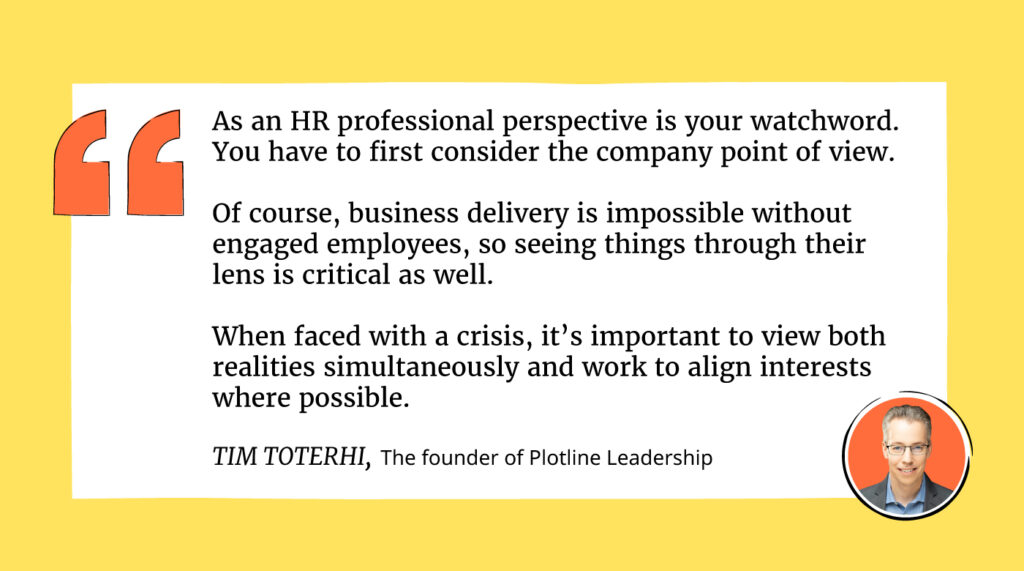As any HR leader will tell you, crises are an inevitable part of the job. Tough situations pop up, and often they’re out of our control. How can companies weather a crisis and turn it into an advantage in the long run?
Hi Tim! Before we dive in, our readers would love to get to know you a bit. Can you tell us the “backstory” about what brought you to this specific career path?
Mine is the tale of a former karate instructor and nuclear fuel broker who switched gears to chase a career in human resources.
I did this by leveraging transferable skills. First, I used my sales expertise to snag a job peddling training products. Then I leveraged my teaching background to thrive as corporate trainer. Once I was where I needed to be, I stayed in learning mode.
Over time, I transitioned from instructor to designer and then to related roles such as performance and talent management. Skill to skill, mentor to mentor, I listened, learned, and ultimately made my way to a CHRO spot.
Are you working on any exciting new projects now? How do you think that will help people?
As an author, I bounce from fiction to non-fiction. With my latest novel, Life Aches: In and Out of the Fishbowl complete, I’m starting work on my next career book. While some advice is timeless, a lot has changed in the world of work. I hope to give the career-minded a new approach to job fulfillment.

None of us are able to achieve success without some help along the way. Is there a particular person who helped get you to where you are? Can you share a story about that?
We often think of career assistance as coming from those “above” us – mentors, managers, and senior executives. But sometimes help can come from where we least expect it – in my case, a student.
After a career in brokerage, I served as an adjunct instructor at a local business school. The creative buzz of the college crowd was at once intoxicating and therapeutic. Part of me wanted to stay in academia, but a few months after my first year I received a call from a recruiter.
This was odd because I hadn’t sent a single resume to anyone. It turns out that a former student referred me for a training manager job leading his department. The action sparked my curiosity in the profession and ultimately drove my career in that direction.
Sometimes the little things we do for each other can have a huge impact. Imagine if we all did more of them.
Fantastic. Thank you for that. Let’s now shift to the main focus of our interview about HR strategies for turning a crisis into an opportunity. Can you share your story of when an organization you’ve worked at entered into a crisis? What happened? What did you do?
Believe it or not, job training was once done exclusively via live, face-to-face, classroom instruction.
Then, when the 90s tech craze began, I found myself at a company that aimed to deliver remote one-on-one learning. This was a pre-web / SAAS model, but it offered personalized instruction while eliminating the need for trainer and participant travel.
And it worked… well, sort of.
Although we built a healthy customer portfolio, in truth, the concept was ahead of its time. Fussy software, complicated hardware specs, and resourcing issues dropped more than one fly in the ointment. When a wicked recession hit and stained all things .com-like, we knew our days were numbered unless we did the unthinkable. We had to pivot.
This meant returning to an old-school instruction model… well, old school with a twist. We offered smaller classes, shorter lessons, and retooled our catalog to focus more on soft skills.
Changing our content was easy. Changing our employee’s mindsets… not so much. While we had always offered soft skills and management content, our best sellers were application-based trainings delivered by introverted Excel wizards, Java Jedis, etc.
Our advisors told us to replace the team, but we knew the cost and time associated with such a dramatic shift in staff would have doomed the company.
Instead, we took a beat and thoughtfully explained the situation to our employees. To be successful in the new model, they would not only have to learn different material but also become comfortable enough to present it in a classroom setting. You know, in front of real live humans… gulp.
Some instantly opted out. But many rose to the challenge and achieved various degrees of success. Their efforts allowed the company to meet customer demand and steer through the recession.
What was your mindset during such a challenging time? Where did you get the drive to keep going when things were so hard?
As an HR professional, perspective is your watchword. You have to first consider the company point of view.
Of course, business delivery is impossible without engaged employees, so seeing things through their lens is critical as well.
When faced with a crisis, it's important to view both realities simultaneously and work to align interests where possible.
Thus, your mindset needs to be neutral and your actions, objective. You can have your feelings but realize that it’s not about you. Your drive in a crisis comes from efficiently navigating a host of issues—action to action—outcome to outcome.
It’s like you’re an ER doctor with admittedly far lower stakes. Simply realizing that provides perspective. What we do is important, but it’s not life or death.
Can you please tell us how you were able to overcome such adversity and how the company ultimately turned the crisis into an opportunity or advantage? What did the next chapter look like?
It’s important to see crisis and opportunity as two sides of a coin. It's no surprise that this view is common in cultures that practice martial arts.
A crisis can feel like an attack. And sure, you can sometimes fight it head-on and win. But true opportunity comes from avoiding the drama and simply directing that negative energy away and into something positive.
In our case, a dramatically changing market threatened to make our product obsolete and our people irrelevant. We could have stubbornly fought it. Lowered prices, offered more, and invested in new, untested technology. All things that would likely dig a deeper hole.
Instead, we just let the attacker stumble past us. We gave customers what they needed in the way they needed it.
The change preserved jobs, smoothed company financials, and allowed us to ride out the recession.
Ultimately, the experiment ended with stakeholders advancing other projects, but those involved were richer in skill and experience for having made the journey.
Based on your experience, can you share five actionable pieces of advice for HR leaders on how companies can turn a crisis into an opportunity or advantage? (please share a story or example for each.)
1. Slow Down
By definition, crisis situations pop up suddenly and seem to demand an immediate response. But our instincts are often incorrect. For example, when a pilot inadvertently flies into the clouds, he may naturally rely on his perceptions to orient himself, but flying blind is the surest way to crash. Instead, he should pause and adjust his strategy by switching to instrument flight. The thoughtful reaction will keep him straight and level until he can emerge from the bad weather.
When we succumb to the pressure to provide a knee-jerk reaction, we often do more harm than good. Instead of simply reacting, pause, reflect, and then select the most appropriate action. The process may only take a few minutes, but those minutes matter.
Case Action: In the case of the tech training company, slowing down allowed us to resist the temptation to fight the recession head-on and instead steer the danger away with a little strategic jujitsu.
2. Acknowledge Reality
Denial can fuel any crisis. When you admit internally that a situation is real, you limit its power. Great leaders will define a crisis by name and ensure their teams understand the reality and gravity of the situation.
Case Action: We spoke truth to power and avoided the simple yet disastrous option of replacing the team. Doing this allowed us to focus our efforts in the right direction.
3. Communicate Reality
The grapevine works and nothing can kill culture faster than a runaway rumor mill. Take control of the message early on by being direct and honest with all stakeholders.
Sometimes leaders hold off on communicating until they have a complete crisis control plan. This is the wrong move. Imaginations are powerful. They can spawn beliefs that routinely trump facts.
Communicating the reality of the crisis in real time builds trust and helps ensure employees look to you for the next installment of factual information.
Case Action: We explained the situation and gave employees a choice. Once armed with the information they were able to make a career decision that was right for them.
4. Answer the Urgent
Once the crisis is identified, and your team is rallied to your side, it’s time to act. Just focus on first things first.
In our pilot example, the longer-term play is to land safely at the destination. But the immediate action required is to ensure you’re not flying upside down toward a mountain.
When facing a business crisis, first steady the craft. Maybe that means conducting a painful layoff or appointing an emergency replacement to fill in for a departed leader. The important thing is to decisively answer the urgent.
Case Action: We realized that, although we were a technology company, people brought the true value. Getting the right ones in place quickly was more important than sorting through technology issues.
5. Flip the Coin—Chase the Opportunity
Done well, steps one to four happen quickly: days, hours even depending on the situation. Once complete, you can flip the crisis coin and look for the opportunity this unforeseen, forced change has provided.
In our pilot example, perhaps it’s a challenge to upgrade your training. In the case of a departed leader, perhaps it’s a chance to reevaluate the skills needed for the role.
Case Action: For us, the opportunity came from embracing old methods in new ways. The blending of classic delivery in bite-sized modules helped us survive the downturn.
What are a few of the most common mistakes you see leaders make when their company hits a crisis? What should be done to avoid them?
They fail to consider the “what’s next?”.
A crisis automatically puts everyone in, well, crisis mode. The focus is on the here and now, the fast and simple.
But a crisis is only a single heartbeat in a company’s lifetime. While there are all sorts of in-the-moment missteps leaders can make, from communication blunders to knee-jerk decisions, the biggest mistake is failing to consider what can and should be learned once the dust settles.
For example, layoffs teach resourcing rigor. Leader vacancies teach succession planning. To truly turn a crisis into an opportunity, flip the coin and take the lesson. You can only do so if you give yourself enough mental whitespace to appreciate what has transpired.
What advice would you give to HR leaders and organizations who have yet to hit their first real crisis?
Prepare, but don’t try to predict.
Crisis situations will vary in size, severity, and scope. Remember, a crisis is like an attack.
If you hyperfocus on a potential uppercut you will undoubtedly get blindsided by a kick to the shin. You can’t outthink the unknown.
Instead of pretending you have a crystal ball, keep a clear mind and a flexible approach. If you prepare and trust that preparation, you’ll be able to duck and counter when the punches come.
If you could inspire a movement that would bring the most amount of good to the most amount of people, what would that be? You never know what your idea can trigger. :-)
At the end of my TEDx talk on diversity I challenged people to BE>.
The idea is that the concept of equality has been co-opted. It has forced us all into boxes, affixed us with labels, and turned us into caricatures that don’t reflect who we actually are. People are individuals, not a collection of checkmarks on some HR staffing form.
When everyone strives to be greater than they were yesterday…when we embrace the power, the complexity, and the beauty of the individual, we’ll be ready to start a higher-level conversation… one with more listening and fewer assumptions.
So, share your story. Better still, listen to your neighbors’. Once we’re each seen, heard, and valued as individuals, not groups, we can rocket beyond equality. We can all BE>.
Thanks Tim! How can our readers continue to follow your work online?
Check out my website for my latest book or career resources. You can also connect with me on LinkedIn.



